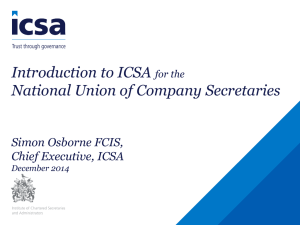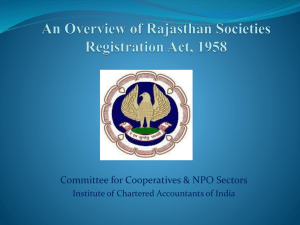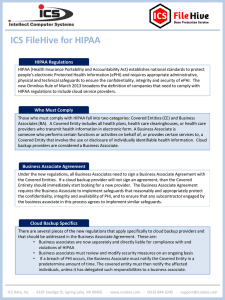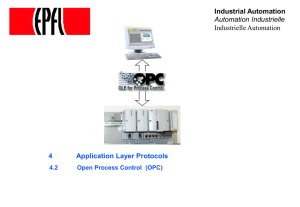cs s dhan pal material on companies act programme
advertisement
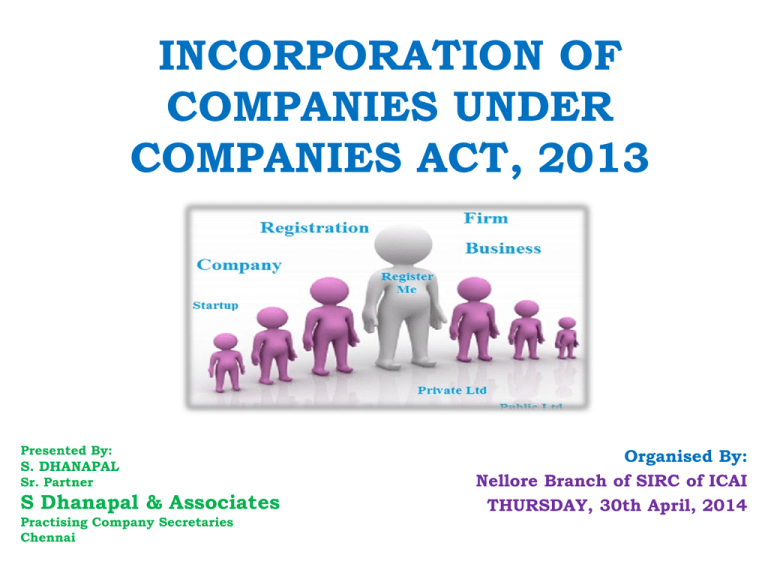
INCORPORATION OF COMPANIES UNDER COMPANIES ACT, 2013 Presented By: S. DHANAPAL Sr. Partner S Dhanapal & Associates Practising Company Secretaries Chennai Organised By: Nellore Branch of SIRC of ICAI THURSDAY, 30th April, 2014 Scheme of Presentation Provisions relating to incorporation of Private & Public Companies Provisions relating to MOA and AOA Incorporation of OPC Incorporation of companies not for profit S Dhanapal & Associates A Firm of Practising Company Secretaries An insight on Changes proposed under Companies Act 2013 Provisions relating to incorporation of Private and Public Companies The only way to make sense out of change is to plunge into it, move with it, and join the dance. S Dhanapal & Associates A Firm of Practising Company Secretaries An insight on Changes proposed under Companies Act 2013 Different Kinds of Companies which can be incorporated under CA, 2013 • Company Limited by shares • Company limited by Guarantee • Unlimited Company • Formation of Companies with charitable objects etc – Section 8 company • Conversion of other form of entities as company under the act (Chapter XXI companies) • One person company S Dhanapal & Associates A Firm of Practising Company Secretaries An insight on Changes proposed under Companies Act 2013 Steps in incorporation of Pvt/Pub Co. Step 1 - Checking Name availability / Obtaining Name Step 2 - Incorporate the company by filing necessary Forms along with the requisite documents and fee Step 3 - If the documents are found in order, ROC will register the company and issue Certificate of incorporation Contd.. S Dhanapal & Associates A Firm of Practising Company Secretaries An insight on Changes proposed under Companies Act 2013 Steps in incorporation contd…. Step 4 - Filing of Document for Registered office of the company within 30 days S Dhanapal & Associates A Firm of Practising Company Secretaries Step 5 - File declaration stating that the capital amount has been brought in by the subscribers Step 6 - Commence business like sales, purchase , borrowing only after completing Step 4 & Step 5 An insight on Changes proposed under Companies Act 2013 Procedural Aspects Documents to be furnished at the time of incorporation • Declaration by Professionals • Affidavit by each of the subscribers to the memorandum and each of the first directors named in the articles • Address for correspondence till registered office is established • Details of subscribers • Particulars of first directors and their consent to act as director • MOA and AOA S Dhanapal & Associates A Firm of Practising Company Secretaries An insight on Changes proposed under Companies Act 2013 Procedural Aspects Details of subscribers that need to be furnished at time of incorporation The following particulars of every subscriber to the memorandum shall be filed with the Registrar: (a) Name and recent Photograph affixed and scan with MOA and AOA (b) Father’s/Mother’s/ Spouse’s name (c) Nationality (d) Date of Birth (e) Place of Birth (District and State) (f) Occupation (g) Income-tax permanent account number (h) Permanent residential address and also Present address ( Time since residing at present address and address of previous residence address (es) if stay of present address is less than one year ) similarly the office/business addresses S Dhanapal & Associates A Firm of Practising Company Secretaries An insight on Changes proposed under Companies Act 2013 Procedural Aspects Details of subscribers that need to be furnished at time of incorporation contd…. (i) Email id of Subscriber (j) Mobile No. of Subscriber (k) Phone No. of Subscriber (l) Fax no. of Subscriber (m) Proof of Identity (n) Residential proof (o) Proof of nationality, in case the subscriber is a foreign national. (p) Each subscriber to the MOA and AOA shall furnish the specimen signature duly verified by their respective banker at the time of incorporation. (q) If the subscriber is already a director or promoter of a company(s), then details of those companies are also needed to be given . S Dhanapal & Associates A Firm of Practising Company Secretaries An insight on Changes proposed under Companies Act 2013 Procedural Aspects Procedure of Signing of Memorandum of Association and Articles of Association by subscriber to Memorandum and Articles of Association If the Subscriber is Literate and Individual • Name, Address, Description and occupation, if any, in the presence of at least one witness • Witness shall sign along with name, address, description and occupation, if any. • The witness shall state that “I witness to subscriber/subscriber(s) who has/have subscribed and signed in my presence. Further I have verified his/their ID for their identification and satisfied myself of his/her/their identification particulars as filled in. He shall also mention the place and date of signing. S Dhanapal & Associates A Firm of Practising Company Secretaries An insight on Changes proposed under Companies Act 2013 Procedural Aspects Procedure of Signing of Memorandum of Association and Articles of Association by subscriber to Memorandum and Articles of Association If the Subscriber is Body Corporate • Same method as mentioned above • However , In case of Body Corporate subscriber, • The memorandum and articles of association shall be signed by director, officer or employee of the body corporate duly authorized in this behalf by a resolution of the board of directors of the body corporate, • The person so authorized shall not, at the same time, be a subscriber to the memorandum and articles of Association. S Dhanapal & Associates A Firm of Practising Company Secretaries An insight on Changes proposed under Companies Act 2013 Procedural Aspects Procedure of Signing of Memorandum of Association and Articles of Association by subscriber to Memorandum and Articles of Association If the Subscriber is Limited Liability Partnership • Same method as mentioned above • However , In case of Limited Liability Partnership subscriber, • It shall be signed by a partner of the Limited Liability Partnership, duly authorized by a resolution approved by all the partners of the Limited Liability Partnership • The person so authorized shall not, at the same time, be a subscriber to the memorandum and articles of Association. S Dhanapal & Associates A Firm of Practising Company Secretaries An insight on Changes proposed under Companies Act 2013 Procedural Aspects Procedure of Signing of Memorandum of Association and Articles of Association by subscriber to Memorandum and Articles of Association If Subscriber is a Foreign national who visited India and intended to incorporate a Company If Subscriber is Foreign National residing outside India and living in a country in any part of Common Wealth countries If Subscriber is Foreign National residing outside India and living in a country which is a party of Hague convention If Subscriber is Foreign National residing outside India and living in a country outside the common wealth and which is not a party to the Hague Apostille Convention S Dhanapal & Associates A Firm of Practising Company Secretaries Same method as mentioned above, However Incorporation shall be allowed only if subscriber is having a valid Business Visa Subscriber’s signatures and address on the memorandum and articles of association and proof of identity shall be notarized by a Notary (Public) in that part of the Commonwealth. Subscriber’s signatures and address on the memorandum and articles of association and proof of identity shall be notarized before a Notary (Public) of the country of his origin and be duly apostillised in accordance with the said Hague Convention Subscriber’s signatures and address on the memorandum and articles of association and proof of identity shall be notarized before a Notary (Public) of such country and the certificate of the Notary (Public) shall be authenticated by a Diplomatic or Consular Officer empowered in this behalf An insight on Changes proposed under Companies Act 2013 Provisions relating to MOA and AOA S Dhanapal & Associates A Firm of Practising Company Secretaries An insight on Changes proposed under Companies Act 2013 Point for noting! Letterheads should include CIN – Section 12 (3) (c) Every Company shall get its name, address of its registered office and the Corporate Identification number along with telephone number, fax number, if any, e-mail and the website address, if any printed in all its business letters, billheads, letter papers and in all its notices and other official publications. If there is name change, former name should come – Proviso to Section 12 (3) Where a company has changed its name(s) during the last two years, it shall paint or affix or print, as the case may be, along with its name, the former name(s) so changed during the last two years as required under clauses (a) and (c) S Dhanapal & Associates A Firm of Practising Company Secretaries An insight on Changes proposed under Companies Act 2013 Memorandum of Association – Section 13 Object Clause: The Object clause of the company is now required to include only the following •The objects for which the company is proposed to be incorporated •Any matter considered necessary in furtherance thereof Does this mean the company cannot have other objects clause in its MOA? Liability clause : It should state, Liability of members of the company, whether limited or unlimited and also in the case of a company limited by shares, that liability of its members is limited to the amount unpaid, if any, on the shares held by them. S Dhanapal & Associates A Firm of Practising Company Secretaries An insight on Changes proposed under Companies Act 2013 Shifting of Registered Office Within same state from one ROC to another ROC Application in form INC 23 to be filed with RD along with annexure as required Notice before one month to be published in english and regional newspaper and individual notice on all debenture holder, creditor and depositor. Objection can be made within 21 days, else deemed as no objection shifting of registered office shall not be allowed if any inquiry, inspection or investigation has been initiated against the company or any prosecution is pending against the company under the Act. S Dhanapal & Associates A Firm of Practising Company Secretaries An insight on Changes proposed under Companies Act 2013 Shifting of Registered Office From one state to another Application in form INC 23 to be filed with CG along with documents as prescribed in rules Notice before 14 days of hearing to be published in English and regional newspaper and individual notice on all debenture holder and creditor. shifting of registered office shall not be allowed if any inquiry, inspection or investigation has been initiated against the company or any prosecution is pending against the company under the Act. S Dhanapal & Associates A Firm of Practising Company Secretaries An insight on Changes proposed under Companies Act 2013 Articles of association- Section 5 Entrenchment Provisions The articles of a company may contain provisions for entrenchment to the effect that specified provisions of the articles may be altered only if conditions or procedures as that are more restrictive than those applicable in the case of a special resolution, are met or complied with Entrenchment provisions can be included either a) At the time of Incorporation of company itself or b) Subsequent to incorporation In case of Public Company For Altering Articles of Association to have Entrenchment clause, Alteration needs to be approved by way of special resolution by members. S Dhanapal & Associates A Firm of Practising Company Secretaries An insight on Changes proposed under Companies Act 2013 Forms to be filed with Registrar for entrenchment (Rule 10 of the Companies (Incorporation) Rules, 2014) In case of existing companies, the Form No. MGT-14 shall be filed within thirty days from the date of including entrenchment clause in the articles. Form of Articles - Rule 11 of the Companies (Incorporation) Rules, 2014. The model articles as prescribed in Table F of Schedule I may be adopted by a company either in totality or otherwise ALTERATION OF ARTICLES – Section 14 The company has to pass special resolution for alteration of articles and has to file Form MGT-14 with Registrar of Companies. S Dhanapal & Associates An insight on Changes proposed under Companies Act 2013 A Firm of Practising Company Secretaries ONE PERSON COMPANY S Dhanapal & Associates A Firm of Practising Company Secretaries An insight on Changes proposed under Companies Act 2013 One Person Company Definition [Section 2(62)] “One Person Company” means a company which has only one person as a member. Salient Features Number of members(Min & Max is 1 ) Number of Directors(Min 1 & Max 12) Name of company (Shall carry word (OPC) Member and Nominee to be natural persons Limit on number of OPCs is restricted to 1 Automatic conversion to pvt/public co. S Dhanapal & Associates A Firm of Practising Company Secretaries An insight on Changes proposed under Companies Act 2013 One Person Company Special requirements, privileges and exemptions: Incorporation (Nomination also is mandatory) Annual Return (Signed by CS or the Director) Financial Statement (Cash flow is not required) Number of Directors (12 with SR no limit) General Meetings (No meeting required) Board Meetings(Two meetings)(Once 6 months) Term of auditor (No rotation is applicable) Contract by OPC ( Shall record in minutes) S Dhanapal & Associates A Firm of Practising Company Secretaries An insight on Changes proposed under Companies Act 2013 One Person Company Mandatory conversion of OPC to pvt/pub co. Voluntary conversion of Pvt./Pub co. to OPC Penal Provisions for OPC S.No. 1. Nature of Default Amount of Penalty Non-Compliance with any Company and Officer in Default – provisions of Act or Rules One time penalty of fine upto Rs. 5000/- plus continuing penalty of fine of Rs. 500/- per day till offence continues. S Dhanapal & Associates A Firm of Practising Company Secretaries An insight on Changes proposed under Companies Act 2013 Incorporation of One Person Company ONE PERSON COMPANY (OPC) Eligible Person for Incorporation & nominee :- 1. 2. 3. Only natural person who is an Indian Citizen & resident in India Resident in India - Stayed in India not less than 182 Days immediately preceding F.Y Maximum - Not more than 1 OPC Nomination – Rule 2.2:- • Subscriber to OPC shall nominate person along with consent and fee as provided in Annex ‘B’ to registrar along with its MOA & AOA. Withdrawal –Nominated person may withdraw his consent by giving notice provided that another person should be appointed as nominee with in 15 days of such withdrawal in same manner provided OPC has to file relevant form within 30 days having notice of such withdrawal. Change – At any time for any reason including in case of death and incapacity to contract such has to be intimated to Roc. • • • Incorporation of One Person Company SOLE MEMBER:- Ceases to be member in the event of Death or his incapacity His Nominee becomes the member of OPC and as such he shall nominate nominee with in 15 days of becoming member Such cessation and nomination has to be filled with the Registrar of Companies PENALTY – RULE 2.3:- OPC and any officer of officer contravenes provision shall be punishable with fine which may extend to 5000 and further fine which may extend to 5000 for everyday if same contravention continues OPC TO CONVERT ITSELF INTO PVT. CO. OR PUBLIC CO – Rule 2.4 Where paid up Share Capital of OPC exceed 50Lakhs or Avg turnover exceed 2 Crores – it ceases to be OPC Such OPC has to convert it self into Pvt. or Public Co. within 6 months from date of increase of paid-up capital beyond 50 Lakh or last day of relevant period during which Avg annual turnover exceeds 2 Crore Within 30 days of such event OPC has to inform that it has ceased to be OPC One Person Company Salient Features • • • • • • • A One Person Company is incorporated as a private limited company. It must have only one member at any point of time and may have only one director. The words “One Person Company” must be mentioned in brackets below the name of the company. The member and nominee should be natural persons, Indian Citizens and resident in India. The term "resident in India" means a person who has stayed in India for a period of not less than 182 days during the immediately preceding one calendar year. One person cannot incorporate more than 1 OPC or become nominee in more than 1 OPC. If a Member of OPC becomes a member in another OPC by virtue of his being nominee in that OPC then within 180 days he shall be meet the eligibility criteria of being Member in one OPC. OPC to lose its status if paid up capital exceeds Rs. 50 lakhs or average annual turnover is more than 2 crores in 3 immediate preceding consecutive years. One Person Company Salient Features • No minor shall become member or nominee of the One Person Company or can hold share with beneficial interest. • Such Company cannot be incorporated or converted into a company under section 8 of the Act. • Such Company cannot carry out Non-Banking Financial Investment activities including investment in securities of any body corporate. • No such company can convert voluntarily into any kind of company unless 2 years is expired from the date of incorporation, except in cases where capital or turnover threshold limits are reached. • Existing Private Limited Companies can convert themselves into one Person Company by following the procedure prescribed in the rules, provided their capital and turnover is below the threshold limits. • The words ‘‘One Person Company’’ shall be mentioned in brackets below the name of such company, wherever its name is printed, affixed or engraved. RESERVATION OF NAME UNDESIRABLE NAMES – Rule 2.5 • • • • • • • It attracts proviso of Section 3 of The Emblems & Names ( Prevention of Improper Use) Act, 1950 Name of the Registered Trade Mark – except consent of the owner of such trademark Identical or too resembles with name of existing Co. or LLP Not in consonance with principal object Other than finance companies no other co. is allowed to use words like financing, leasing, chit fund, investments , securities….. Proposed name is identical to Co. dissolved and the period of 2 years has not elapsed from such dissolution or if the proposed name is struck off in pursuant to Section 248, the same will not be allowed before expiry of 20 years or in case of LLP 5 Years Changed its activities if not reflected in its name than it shall change its name in line with activities within period of 6 month SECTION 8 COMPANY S Dhanapal & Associates A Firm of Practising Company Secretaries An insight on Changes proposed under Companies Act 2013 Steps in incorporation • Step 1 - Checking Name availability / Obtaining Name • Step 2 - Apply for grant of license by filing necessary Form along with the requisite documents and fee • Step 3 - Applicant shall Within a week of application, publish a notice as per Form 2.18 at his own expenses at least once in a) Vernacular language in vernacular paper and b) English Language in English Paper and c) on websites to be notified by central Government S Dhanapal & Associates A Firm of Practising Company Secretaries An insight on Changes proposed under Companies Act 2013 Steps in incorporation • Step 4 - Deliver the copy of the notice forthwith to Registrar • Step 5 - Registrar may require an applicant to furnish approval or concurrence of any appropriate authority, regulatory body, department, ministry of central or state government, if required. • Step 6 - If registrar decides to issue license, license shall be in form 2.19 and he will have power to include conditions, as may be deemed necessary. • Step 7 - Incorporate the company by filing necessary form along with the requisite documents and fee S Dhanapal & Associates A Firm of Practising Company Secretaries An insight on Changes proposed under Companies Act 2013 Steps in incorporation • Step 8 - If the documents are found in order, ROC will register the company and issue Certificate of incorporation (Section 7 (2)) • Step 9 - Filing of Document for Registered office of the company in along with necessary documents within 30 days of incorporation (Section 12) • Step 10 - File declaration in stating that the capital amount has been brought in by the subscribers. (Section 11) • Step 11 - Commence business like sales , purchase , borrowing only after completing Step 9 & Step 10 S Dhanapal & Associates A Firm of Practising Company Secretaries An insight on Changes proposed under Companies Act 2013 Quick Recap Basis for Comparison Maximum number of members for private companies Object Clause of MOA Registered Office Commencement of Business Provision contained in Companies Act, 1956 Provision contained in Companies Act, 2013 50 (Fifty) 200 (Two Hundred) Object clause bifurcated into – Main Objects, Incidental or Ancillary Objects and Other Objects. MOA to contain the objects for which the company is proposed to be incorporated and any matter considered necessary in furtherance thereof. Companies are required to furnish the details of the A company shall, on and from the 15th day of its Registered office of the company by filing Form 18 incorporation have a registered office. The at the time of incorporation. company is also required to furnish to the Registrar verification of its registered office within a period of thirty days of its incorporation in a prescribed manner. Notice of every change of the situation of the Notice of every change of the situation of the registered office, shall be given to the Registrar registered office, shall be given to the Registrar within thirty days of the change, who shall record within fifteen days of the change, who shall record the same. the same. Provision is applicable only to public limited Applicable to all companies having share capital. companies S Dhanapal & Associates A Firm of Practising Company Secretaries An insight on Changes proposed under Companies Act 2013 Quick Recap….. Affidavit to be filed by first directors and subscribers that they have not been convicted of any offence, breach of duty to any company etc. and that all information furnished regarding incorporation is true and complete to their knowledge. Proof of identity to be furnished for all directors and subscribers Directors’ interest in other companies/body corporate to be furnished. Subscription money to be brought in within 180 days of incorporation AOA may contain entrenchment provision. Notice of change in situation of registered office and alteration of articles to be filed with ROC within 15 days instead of 30 days as provided in the earlier Act. S Dhanapal & Associates A Firm of Practising Company Secretaries An insight on Changes proposed under Companies Act 2013 Penal Provisions Section 7(5) 7 (6) Nature of Default Penalty If any person furnishes any false or incorrect particulars of any information or suppresses any material information, of which he is aware in any of the documents filed with the Registrar in relation to the registration of a company The promoters, the persons named as the first directors of the company and the persons making declaration are liable where, at any time after the incorporation of a company, it is proved that the company has been got incorporated by furnishing any false or incorrect information or representation or by suppressing any material fact or information in any of the documents or declaration filed or made for incorporating such company, or by any fraudulent action He is liable for action of Fraud under section 447, for which punishment is Imprisonment for a term which shall not be less than six months but which may extend to ten years and shall also be liable to fine which shall not be less than the amount involved in the fraud, but which may extend to three times the amount involved in the fraud They are liable for action of Fraud under section 447, for which punishment is Imprisonment for a term which shall not be less than six months but which may extend to ten years and shall also be liable to fine which shall not be less than the amount involved in the fraud, but which may extend to three times the amount involved in the fraud S Dhanapal & Associates A Firm of Practising Company Secretaries An insight on Changes proposed under Companies Act 2013 Penal Provisions Section Nature of Default Penalty Proviso to 8 (11) when it is proved that the affairs of the section 8 company were conducted fraudulently, every officer in default is liable They are liable for action of Fraud under section 447, for which punishment is Imprisonment for a term which shall not be less than six months but which may extend to ten years and shall also be liable to fine which shall not be less than the amount involved in the fraud, but which may extend to three times the amount involved in the fraud 11 (2) If company makes default in complying with requirements of Section 11 a. Company will be liable for fine which may extend to five thousand rupees. b. Every officer of the company who is in default shall be punishable with fine which may extend to one thousand rupees for every day. S Dhanapal & Associates A Firm of Practising Company Secretaries An insight on Changes proposed under Companies Act 2013 Penal Provisions Section 12 (8) Nature of Default Penalty If company makes default in Company and every officer of the company who complying with requirements of is in default shall be punishable with fine which Section 12 may extend to one thousand rupees for every day during which the default continues but not exceeding one lakh rupees. S Dhanapal & Associates A Firm of Practising Company Secretaries An insight on Changes proposed under Companies Act 2013 FORMS PRESCRIBED FOR INCORPORATION Form no.INC 2 Nomination of the person who shall, in the event of subscriber’s death or his incapacity to contract, become the member of OPC Form no.INC 3 Consent of the person who shall, in the event of subscriber’s/member’s death or his incapacity to contract, become the member of OPC Form no.INC 3 Notice of withdrawal of consent by the nominee of OPC Form no.INC 4 Intimation about change in the name of the nominee of OPC Form no.INC 4 Intimation of cessation Form no.INC 5 Form no.INC 7 Form no.INC 2 Notice to the Registrar by one person company giving intimation of ceasing to be such company Application for incorporation of a company [Pursuant to section 7(1) and rule 12] Notice of provisions of entrenchment in Articles of Association incase of Incorporation of the Company Form no.INC 7 Application for incorporation of a company Form no.INC 8 Declaration [Pursuant to section 7(1)(b) and rule 2.11] Form no.INC 9 Affidavit Form no.DIR 12 Particulars of appointment of first directors and their consent to act as such and the disclosure of their interest in other firms or body corporate Form no.INC 25 The Certificate of Incorporation Form no.INC 12 Application to the Registrar for the grant of licence under section 8 Form no.INC 14 Declaration Form no.INC 15 Declaration Form no.INC 13 Memorandum of association Form no.INC 26 notice Form no.INC 16 Licence under section 8 (1) of the Companies Act, 2013 Form no.INC 17 Licence under section 8 (5) of the Companies Act, 2014 Form no.INC 18 Application to Regional Director for conversion of a company under section 8 into any other kind of company Form no.INC 19 Notice Form no.INC 20 Intimation to Registrar of revocation of licence issued under section 8 Form no.INC 21 Declaration prior to the commencement of business or exercising borrowing powers Form no.INC 22 Notice of situation or change of situation of registered office Form no.INC 22 Application for confirmation by Regional Director for change of registered office of the company within the State Form no.INC 25 Certificate of Incorporation pursuant to change of name Form no.INC 23 Form no.INC 28 Application to the Central Government for approval to shift the Registered Office from one State to another Notice of order of the Central Government approving the transfer of registered office from one State to another or within the State S Dhanapal & Associates A Firm of Practising Company Secretaries An insight on Changes proposed under Companies Act 2013 REFLECTIONS TO



